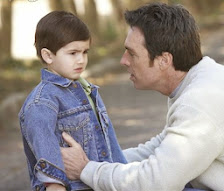"We have been to many professionals over the years to get help for our son. It seems as though each therapist or psychiatrist we see comes up with a different diagnosis. First, our son had ADHD ...then he had OCD ...then it was ODD ...now it's autism (on the high functioning end of the spectrum). Who are we to trust? Can he really have all of these disorders? Help!"
When parents seek help for their youngster with ASD level 1, or High-Functioning Autism (HFA), they encounter varied opinions from family, friends, teachers, and even professionals. For example: "he'll outgrow it" ... "leave him alone" ... "he's just being lazy" ... "he's just being defiant" ... "it's no big deal" ... "he just wants attention" ... "he's probably got ADHD" ...and so on.
Many professionals try to work with the "special needs" youngster as if his disorder is like other developmental disorders, but it is quite different. In most cases, there is a great misunderstanding by many people of the needs of kids on the autism spectrum.
For the inexperienced, recognizing the defining characteristics of the disorder can be difficult, and misdiagnoses are quite common. This is further complicated by the fact that an HFA youngster has many of the same characteristics found in other disorders. These various characteristics are often misinterpreted, overlooked, under-emphasized, or over-emphasized. As a result, the youngster may receive many different diagnoses over time or from different professionals.
For example, if a young person with HFA demonstrates a high degree of attention deficits and/or hyperactivity, ADHD might be the only diagnosis he receives. However, this is a common characteristic of kids on the spectrum. The same holds true if obsessive or compulsive behaviors are displayed – the youngster gets labeled with obsessive-compulsive disorder (OCD) instead of HFA.
The following traits are also commonly seen in those on the spectrum in varying degrees. However, just because these traits are there, it doesn't mean that the youngster should be diagnosed differently; these traits should be noted as significant features of HFA:
- Anxiety
- Difficulty with pragmatic language skills
- Hyperlexia (advanced word recognition skills)
- Motor deficits
- Oppositional defiant disorder (ODD)
- Sensory difficulties
- Social skills deficits
Professionals who do not have much experience with autism have a hard time identifying the defining characteristics. For example, social skill deficits may be noted by a professional, but then they are often downplayed because the child or adolescent appears to be having appropriate conversations with others or seems to be interested in other people. But with an autistic child, the conversations are not generally reciprocal, so the boy or girl must be carefully observed to see whether or not there is true back-and-forth interaction.
Also, many kids on the autism spectrum have an interest in others, but you need to clarify if the objects of their interest are age appropriate. Do they interact with peers in an age-appropriate fashion? Can they maintain friendships over a period of time or do they end as the novelty wears off? These are the types of observations and questions that must be asked in order to ensure a proper diagnosis.
Another example of an overlooked area is the narrow routines or rituals that are supposed to be present. This does not always manifest as obsessive-compulsive behavior in the typical sense (e.g., repeated hand washing or neatness), but rather in the insistence on the need for rules about many issues and situations. These kids may not throw tantrums over their need for rules, but may require them just as much as the child who has a meltdown when a rule is violated. In essence, there is no single profile of the typical child on the spectrum.
Because of these subtleties and nuances, the single most important consideration in diagnosis is that the clinician making the initial diagnosis be familiar with Autistic Spectrum Disorders (ASD). They should have previously diagnosed numerous clients who fall on the spectrum.
To make a proper, initial diagnosis requires the following:
- It is important to include a speech and language evaluation, as those with HFA will display impairments in the pragmatics and semantics of language, despite having adequate receptive and expressive language. This will also serve to make parents aware of any unusual language patterns the youngster displays that will interfere in later social situations. Again, these oddities may not be recognized if the evaluator is not familiar with ASD.
- The youngster should see a neurologist or developmental pediatrician (one familiar with ASD) for a thorough neurological exam to rule out other medical conditions and to assess the need for medication. The physician may suggest additional medical testing (e.g., blood, urine, fragile X, hearing).
- Both parents and the "special needs" youngster should have sessions with a psychologist where the child is carefully observed to see how he responds in various situations. This is done through play or talk sessions in the psychologist's office and by discussions with both parents. The psychologist may ask parents to complete checklists or questionnaires to gain a better understanding of the youngster's behaviors at home and/or school. If the boy or girl is in school, the psychologist may call the student's teacher or ask her to complete additional checklists. The checklists or questionnaires used should be ones that are appropriate for young people on the autism spectrum. It is important to determine the IQ level of the youngster as well. An average or above-average IQ is necessary for a diagnosis of HFA.
- An evaluation by an occupational therapist familiar with sensory integration difficulties may provide additional and valuable information.
Resources for parents of children and teens on the autism spectrum:
==> Videos for Parents of Children and Teens with ASD
----------
COMMENT FROM A MOTHER:
My name is Kim and I am writing in regards to my daughter, Naomi, who is eleven and will be in the 5th grade. I apologize ahead of time if this becomes a bit lengthy. When Naomi was in first grade, her teacher mentioned that she thought Naomi could possibly have Asperger’s. I did some research and because Naomi shows emotions and can read emotions, I dismissed this notion Although she does misplace her emotions, laughing inappropriately a lot. However, I did at this time recognize some repetitive behaviors but thought well that’s not enough to search any further. Naomi has been in speech for language impairment (receptive and expressive) since first grade and this year was reevaluated to see if she still qualified for services. After 3 years, her scores dropped significantly. In addition, her 4th grade teacher toward the end of the school year mentioned to me she thought Naomi may have Asperger’s. The combination of these two events sent me on a tail spin. I started searching and studying and was totally astonished by what I was finding. Of course, I had a couple more years of observing more behaviors since I first looked up Asperger’s.
I always knew Naomi was different and we have struggled for years with her but really kept most of these struggles to ourselves and close family members. I kept thinking her maturity level would get better but found this year it had seemed to plummet and my concerns for her only having one more year before middle school really hurt my heart for her. I wanted to get help this summer hoping that we could get something in place this school year to prepare her for middle school. Our family doctor referred us to a pediatric psychiatric. He spent an hour with my husband and I the first visit and the second visit was suppose to be the same for Naomi. He only spent 30 minutes with her. I think this is because she does not elaborate on anything with others, sort of like school she shuts down. I had prepared and reflected back for weeks before going and made extensive notes on behaviors we have observed. When my husband and I returned for the 3rd visit, we were told she had generalized anxiety disorder. He noticed our faces drop and said, “I can sense you are not satisfied with what I’ve said.” I didn’t want to seem unappreciated of his professional opinion but in my hearts of all hearts I know my girl and I just feel like there is more to it.
Reflections of Naomi
Very Literal-
Naomi’s uncle tells her she has grown a foot. She looks very puzzled and sadly a little scared and looks down at her feet.
I tell her that I ran into someone at the store. She replies “Oh, did you hurt them.”
I was explaining to Naomi that we would be having these appointments because her teacher felt she was having some trouble….before I could explain with her language skills, she burst out crying saying she never gets in trouble and only pulled a card one time in first grade when she didn’t know that she wasn’t suppose to look at other people’s papers.
Eye appointment-Couldn’t read the smallest line after being ask several times because she didn’t see a line on the chart.
Routine-
Naomi is compelled to dress in a certain order. She gets upset if her shoes are in the bathroom and a sibling is showering. I have worked with her and she is beginning to realize that she can eat or brush her hair while waiting on her shoes but it is like she still has this need to do it.
She knows this certain route we take to the orthodontist and if it changes she letting me know we are going the wrong way.
When she was younger she wanted us to repeat back everything she said before going to bed. After we would leave the room she would keep saying goodnight and wait and if we didn’t repeat it back she would yell it out louder. Then she would say, “see you in the morning” and wait for us to repeat. This was over and over for a long time. We would tell her she had to stop and go to bed. She would get very upset. This was every night probably for a couple of years.
This last school year for the first six weeks, Naomi would ask me every day before getting out of the van “am I a car rider today?” I would reply, “Yes, you are a car rider every day and have always been a car rider.” She has been a car rider for 4 years.
About five years ago, several family or friends passed away. Every night for at least a year she would ask me “Are you going to be here in the morning?”
Still tells me and she is 11 that she’s got to use the bathroom (it’s almost like because I told her when she was potty training: “make sure you tell me if you need to use the bathroom” that it has become ingrained into her and even if I tell her she doesn’t need to tell me anymore she can’t stop. NOT every time but still a lot of the time-and I mean at home.
Dates and Times-
If Naomi knows when any appointment is she will remind you constantly. I had to schedule her appointments so she didn’t hear because she would tell me every day or every other day for a month until that appointment time.
One teacher told me that she always would remind her about certain dates or times.
If we have company coming and she knows what time that are suppose to come and they are late; Naomi will ask every few minutes where they are at until they arrive and tension mounts the later it gets.
If the time clock at a basketball is not started or the period doesn’t get changed she gets very anxious. Once at team camp, they forgot to start the clock for 3 minutes. That was the longest 3 minutes EVER!!!!!!!!!!!!! She doesn’t play sports we were watching her sister.
Emotionally-
No middle ground with Naomi
She is either extremely happy or very upset
Still cries over a bunny that died 2 years ago (sometimes not sure if she is just trying to get attention)
Laughs inappropriately a lot of the time
Very small things that seem like nothing can set her off. She could go on and on and on for an hour sometimes (having a tantrum or meltdown?).
Doesn’t want anyone to be upset with her
She worries about everybody. If someone is hurt she has lots of compassion. (if someone her daddy knows at work father dies, she will cry and she doesn’t even know them)
She cries over people on biggest loser being so over weight (she feels sorry for them)
She comes home from school upset. She will say “Mommy, I never get a card pulled.” I will tell her that’s good Naomi. She repeats and I ask her if someone got a card pulled and she starts crying. Same thing if someone gets pebbles taken out of the jar. She gets upset and tells me.
Along this same line, she tells on her brother and sister all the time for everything under the sun. If they didn’t say thank you or if they didn’t carry their dishes over to the sink or if they don’t answer when I call them she yells and tells them they need to answer me.
There was a field trip I could not attend this school year. She said the night before she couldn’t sleep because her heart was beating so hard.
Crying and throwing a fit for 30 minutes and out of the blue she starts laughing
Makes random noises a lot.
Especially when she was younger would go outside and be singing songs with words that didn’t make sense or going from one subject to another
If she is upset and you ignore she gets louder and louder (screams answer me or listen) If you answer her and it’s not what she wants to hear or she doesn’t understand the answer she keeps on and on and on
Seems to be obsessive-
List making over and over of the same thing at times even erased and rewritten over the top. List of foods. List of people at her school. People in the world. Same list over and over on different paper. I started saving and have a file folder full (This has slowed down)
When she was younger she would work the same puzzle over and over and over
Colored same picture probably 100 times would copy it over and over
Maturity level-
She talks really small (like she is 4 ) It has gotten to the point (especially at home that I am wondering if it has almost become the normal and I can’t remember her regular voice.
Fixated on princesses
Poor hygiene (not wanting to wipe) putting dirty under clothes in drawers
Wetting clothes at times
Been wearing a bra for over a year and can’t put it on correctly
Socially-
Very inward at school
If a teacher request Naomi to do errands like going to get something from the office or take something to the classroom across the hall –she will not
Doesn’t want to get in trouble at all and makes sure she tells me when she gets home if anybody else gets in trouble
Doesn’t play kickball on playground (ask her why)-she says she’s afraid she won’t understand what to do and will be embarrassed. With this being said, I really feel like she would want to deep down. Her brother and sister both play basketball and at times I think she would have liked to but she doesn’t want the coaches to yell at her and is afraid to be out in front of everybody.
All teachers have loved her and students seem to be protective especially knowing she as peanut allergy
Gets behavior awards at school
LOUD AT HOME
Hangs on to me if others approach and we are out in public
Whispers if she wants to tell me something and others are around (at a ballgame or even at her Nana’s)
Tells on everybody all the time no matter how big or how small
Gets along with children who are younger than her because they like the same things
Miscellaneous-
When Naomi was younger and I would be talking to her and the expression on her face would be as if she just didn’t get what I was saying as if it was going over her head. She will use words inappropriately (let me tell you a question) and say words that are not words
Ask her what 77 minus 1 is equal to and she is most likely will not be able to verbally tell you.
Recently, I owed her $10. Gave her a twenty and was showing her I was taking $10. She did not understand this at all. No matter how I showed her. She thought I was giving her too much. Finally, she just agreed she understood but I knew she didn’t.
She will agree a lot of the times if she doesn’t understand. This concerns me because she could easily be taken advantage of.
For two years I have had to walk to the sink at the orthodontist with Naomi (even if I am sitting 2 feet away) and finally the last few times she has gone by herself.
~~~~~~~~~~~~~~~~~~~~~~~~~~~~~~~~~~~~~~~~~~~~~~~~~
More comments:
• Anonymous said... We often focus so much energy on finding a diagnosis that we forget at the end of the day the label does not define what our child needs or who they are. Figuring out how your going to help your child reach their maximum potential is what matters!
• Anonymous said... They are all very similar and intertwined. I just think teaching them how to cope with the umbrella of symptoms is the most important part. They are just labels that's all. Each kid is unique and different and we as parents just need to help them along the way.
• Anonymous said... My son has them all plus sensory disorder and he has Aspergers
• Anonymous said... I have been through same problem. Some things you mentioned are misdiagnosed because they are similar to parts of aspergers. Main thing I keep in mind is no one knows my son better than me and just because someone has letters behind their name doesnt mean they know everything.
Post your comment below…
 Children with High-Functioning Autism (HFA) and Asperger's have excellent rote memories and often show intense interest in one or two intellectual areas, such as math, transportation, history, or the characters in a television series.
Children with High-Functioning Autism (HFA) and Asperger's have excellent rote memories and often show intense interest in one or two intellectual areas, such as math, transportation, history, or the characters in a television series.








.jpg)


